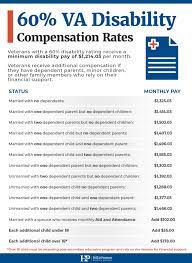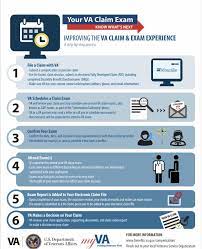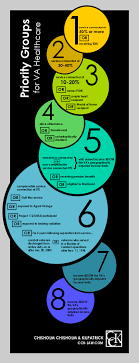Title: Understanding the Importance of 60% VA Disability Rating for Veterans
Introduction:
For veterans who have served our country and have been impacted by service-related disabilities, the Department of Veterans Affairs (VA) offers disability benefits. These benefits are designed to provide financial assistance and support to veterans who have incurred disabilities or injuries during their military service. Among the various disability ratings, a 60% VA disability rating holds significant importance. In this article, we will explore what a 60% VA disability rating entails and why it matters for veterans.
What is a 60% VA Disability Rating?
A 60% VA disability rating signifies that a veteran’s service-connected condition or conditions are assessed to be moderately severe. This rating is determined based on the medical evidence provided by the veteran, including medical records, examinations, and other relevant documentation. The rating takes into account the impact of these disabilities on the veteran’s overall ability to function in daily life.
Importance of a 60% VA Disability Rating:
- Financial Support: A higher disability rating generally results in increased compensation from the VA. A 60% VA disability rating ensures that veterans receive adequate financial support to help cover their living expenses and medical costs associated with their service-connected disabilities.
- Access to Additional Benefits: Veterans with a 60% disability rating gain access to additional benefits such as healthcare coverage for themselves and their dependents through the VA healthcare system. This includes access to specialized medical services, medications, mental health support, and rehabilitation programs tailored to their needs.
- Priority Status: Veterans with a 60% or higher VA disability rating are given priority status when seeking medical treatment at VA facilities. This allows them to receive timely care and appointments, ensuring that their health needs are addressed promptly.
- Dependents’ Benefits: A 60% or higher disability rating also makes veterans eligible for Dependency and Indemnity Compensation (DIC). DIC provides financial support to the veteran’s spouse, children, or dependent parents in the event of the veteran’s death, if it is determined to be service-connected.
- Social Security Disability Benefits: A 60% VA disability rating may strengthen a veteran’s claim for Social Security Disability Insurance (SSDI) benefits. While SSDI is a separate program from VA disability benefits, having a higher VA disability rating can bolster a veteran’s case when applying for SSDI.
Conclusion:
A 60% VA disability rating is an important milestone for veterans with service-connected disabilities. It not only ensures financial assistance but also opens doors to additional benefits and support systems that can greatly enhance their quality of life. Veterans with this rating should be aware of the resources and entitlements available to them through the VA and other government programs. If you are a veteran seeking assistance or information about your disability rating, reach out to your local VA office or consult with a veterans’ service organization for guidance on navigating these processes effectively.
Essential Tips for Navigating VA Disability Claims and Appeals for 60% Disability
- Make sure you have all the necessary documentation to back up your claim when you apply for VA disability.
- Be aware of the deadlines and filing requirements for submitting your VA disability application.
- Research the various types of benefits available through the VA disability program, such as compensation, pension, vocational rehabilitation, and education benefits.
- Seek advice from a qualified attorney or accredited representative if you need help with your application or appeals process.
- Keep track of all communication with the VA regarding your claim and any changes in status or decisions made by them; this will be helpful if you need to appeal a decision later on down the line.
Make sure you have all the necessary documentation to back up your claim when you apply for VA disability.
Title: Essential Tip for Veterans: Gather Strong Documentation for Your VA Disability Claim
Introduction:
When applying for VA disability benefits, it is crucial to have solid documentation that supports your claim. Having the necessary evidence can significantly increase your chances of receiving a fair and accurate disability rating from the Department of Veterans Affairs (VA). In this article, we will emphasize the importance of gathering comprehensive documentation to strengthen your VA disability claim.
Why Documentation Matters:
- Establishing Service Connection: To receive VA disability benefits, you must demonstrate that your disabilities are connected to your military service. This requires providing medical records, service records, incident reports, and any other relevant documentation that links your disabilities to specific events or circumstances during your service.
- Supporting Medical Evidence: Medical evidence is crucial in proving the extent and severity of your disabilities. Gather medical records, test results, diagnoses, treatment plans, and statements from healthcare professionals who have treated you for your service-connected conditions. These documents provide objective evidence that supports your claim.
- Nexus Letters: A nexus letter is a statement from a qualified medical professional that establishes a connection between your current disabilities and your military service. These letters can be instrumental in strengthening your case by providing an expert opinion on the link between your conditions and military service.
- Lay Statements: Don’t underestimate the power of personal testimonies. Collect statements from family members, friends, fellow servicemembers, or anyone who can attest to witnessing or experiencing the impact of your disabilities on your daily life and functioning. These lay statements provide valuable insight into the non-medical aspects of your condition.
- Additional Supporting Documents: Any other relevant documents such as accident reports, performance evaluations affected by disabilities, or letters from employers acknowledging work limitations should also be included in your application package.
Conclusion:
When applying for VA disability benefits, remember that thorough documentation is essential to support the validity of your claim. Gathering all necessary records helps establish a strong case for the VA to evaluate your disabilities accurately. Ensure you have medical evidence, nexus letters, lay statements, and any other pertinent documents to present a comprehensive picture of your service-connected conditions. If you need assistance or guidance during the application process, consider reaching out to veterans’ service organizations or consulting with professionals well-versed in VA disability claims. By being proactive and diligent in gathering documentation, you can increase your chances of obtaining a fair and just VA disability rating.
Be aware of the deadlines and filing requirements for submitting your VA disability application.
Title: The Importance of Meeting Deadlines and Filing Requirements for Your VA Disability Application
Introduction:
If you are a veteran seeking VA disability benefits, it is crucial to understand the significance of meeting deadlines and fulfilling filing requirements when submitting your application. Timeliness and adherence to these guidelines can greatly impact the success of your claim. In this article, we will discuss why it is essential to be aware of the deadlines and filing requirements for your VA disability application.
Meeting Deadlines:
The VA has specific time limits within which veterans must file their disability claims. Generally, veterans have up to one year from the date of discharge or separation from military service to submit their initial claim. Failing to meet this deadline may result in the loss of potential benefits. However, there are exceptions for certain circumstances such as newly recognized conditions or changes in existing conditions.
It is crucial to gather all necessary documentation and evidence supporting your claim as soon as possible. Delays in obtaining medical records or other required paperwork can hinder the timely submission of your application. Being proactive and organized throughout the process will help ensure that you meet all deadlines set by the VA.
Fulfilling Filing Requirements:
The VA has specific requirements regarding how disability claims should be filed. It is important to familiarize yourself with these requirements, as non-compliance can lead to delays or even denial of benefits.
One key aspect is completing the necessary forms accurately and thoroughly. Ensure that you provide all relevant information about your service-connected disabilities, medical history, and any supporting evidence that strengthens your claim. Missing or incomplete information may result in additional requests for clarification or evidence, prolonging the decision-making process.
Additionally, be aware of any specific regional office procedures or additional documentation requirements that may apply in your case. Each regional office may have its own unique guidelines, so it is important to research and follow their instructions carefully.
Conclusion:
When applying for VA disability benefits, being aware of deadlines and filing requirements is crucial. Meeting these deadlines ensures that you do not miss out on potential benefits, while fulfilling the filing requirements accurately and thoroughly strengthens your claim. Remember to gather all necessary documentation promptly, complete the required forms with precision, and familiarize yourself with any specific regional office procedures. If you have any questions or concerns, reach out to your local VA office or seek assistance from a veterans’ service organization to ensure a smooth application process.
Research the various types of benefits available through the VA disability program, such as compensation, pension, vocational rehabilitation, and education benefits.
Title: Exploring the Array of Benefits Available with a 60% VA Disability Rating
Introduction:
When it comes to navigating the VA disability program, knowledge is power. Veterans with a 60% VA disability rating should take the time to research and understand the various types of benefits available to them. By familiarizing themselves with compensation, pension, vocational rehabilitation, and education benefits, veterans can maximize their support and improve their quality of life.
Compensation Benefits:
Compensation benefits are designed to provide financial assistance to veterans who have incurred disabilities or injuries during their military service. With a 60% VA disability rating, veterans can receive compensation payments that reflect the severity of their service-connected conditions. It is crucial for veterans to understand how these payments are calculated and how they can access them.
Pension Benefits:
Pension benefits are intended for veterans who have non-service-related disabilities and meet certain income and asset requirements. However, veterans with a 60% VA disability rating may still be eligible for pension benefits if they have additional non-service-connected disabilities that contribute to their overall impairment. Researching this benefit can help veterans explore all available options for financial support.
Vocational Rehabilitation:
The Vocational Rehabilitation and Employment (VR&E) program assists disabled veterans in finding suitable employment opportunities. Veterans with a 60% VA disability rating may qualify for this program, which provides vocational counseling, training, job placement assistance, and other supportive services aimed at enhancing employability.
Education Benefits:
Education benefits through programs like the Post-9/11 GI Bill can open doors for veterans pursuing higher education or vocational training. With a 60% VA disability rating, veterans may be eligible for increased educational assistance that covers tuition fees, housing allowances, book stipends, and more. Understanding these education benefits allows veterans to make informed decisions about their future educational endeavors.
Conclusion:
Researching the various types of benefits available through the VA disability program is essential for veterans with a 60% VA disability rating. By delving into compensation, pension, vocational rehabilitation, and education benefits, veterans can gain a comprehensive understanding of the support systems available to them. This knowledge empowers veterans to access the benefits they are entitled to and make informed decisions about their financial stability, employment prospects, and educational pursuits. Veterans should reach out to their local VA offices or seek guidance from veterans’ service organizations to navigate these benefits effectively.
Seek advice from a qualified attorney or accredited representative if you need help with your application or appeals process.
Title: Seeking Professional Guidance for Your 60% VA Disability Application
Introduction:
When it comes to applying for a 60% VA disability rating, the process can be complex and overwhelming. To ensure that you receive the benefits you deserve, seeking advice from a qualified attorney or accredited representative can make a significant difference. In this article, we will discuss the importance of seeking professional guidance when navigating your application or appeals process.
Why Seek Professional Assistance?
- Expertise and Knowledge: Attorneys and accredited representatives who specialize in veterans’ benefits have in-depth knowledge of the laws, regulations, and procedures involved in the VA disability claims process. They understand how to present your case effectively and maximize your chances of obtaining a favorable outcome.
- Application Guidance: Applying for a 60% VA disability rating requires gathering extensive medical evidence, completing forms accurately, and presenting a strong argument to support your claim. A qualified attorney or accredited representative can guide you through each step, ensuring that your application is thorough, well-documented, and meets all necessary requirements.
- Appeals Support: If your initial claim is denied or receives an unfavorable decision, you have the right to appeal. The appeals process can be complex and time-consuming. A knowledgeable professional can assist you in understanding the reasons for denial, gathering additional evidence if needed, and presenting a compelling case during hearings or reviews.
- Maximizing Benefits: Professionals experienced in veterans’ benefits understand how different disabilities may interact with one another and impact your overall disability rating. They can help identify any overlooked conditions that may contribute to increasing your rating beyond 60%. This expertise ensures that you receive the maximum benefits available based on your specific circumstances.
- Peace of Mind: Navigating the VA disability system on your own can be daunting and stressful. By enlisting the support of an attorney or accredited representative, you gain peace of mind knowing that an experienced advocate is fighting for your rights and best interests. They will handle the paperwork, communicate with the VA on your behalf, and keep you informed throughout the process.
Conclusion:
Seeking advice from a qualified attorney or accredited representative is a wise decision when applying for a 60% VA disability rating or appealing a decision. Their expertise, knowledge of the system, and dedication to serving veterans can greatly enhance your chances of success. Remember, you don’t have to face this process alone—there are professionals ready to assist you in obtaining the benefits you deserve. Reach out to local veterans’ service organizations or legal firms specializing in veterans’ benefits to find the support you need.
Keep track of all communication with the VA regarding your claim and any changes in status or decisions made by them; this will be helpful if you need to appeal a decision later on down the line.
Title: The Importance of Documenting Communication with the VA for Your 60% VA Disability Claim
Introduction:
When pursuing a 60% VA disability rating, it is crucial for veterans to keep meticulous records of all communication with the Department of Veterans Affairs (VA) regarding their claim. This includes documenting any changes in status or decisions made by the VA. By maintaining a comprehensive record, veterans can effectively navigate their claims process and have valuable evidence at hand if they need to appeal a decision in the future.
Why Documenting Communication Matters:
- Accuracy and Clarity: Keeping track of all communication ensures that you have an accurate record of what has been discussed or decided upon during your interactions with the VA. It helps prevent misunderstandings or misinterpretations that may arise due to lapses in memory or differing recollections.
- Reference and Verification: Having documented proof of your conversations, correspondence, and any changes in status provides a solid reference point for future inquiries or appeals. In case you need to revisit specific details or verify information, these records will serve as a reliable source.
- Supporting Appeals: Unfortunately, there are instances where veterans may disagree with the decisions made by the VA regarding their disability claims. In such cases, having a well-documented history of communication can be immensely helpful when preparing an appeal. These records can provide evidence to support your arguments and demonstrate any inconsistencies or errors in previous decisions.
Tips for Documenting Communication:
a) Create a dedicated folder or digital file: Keep all physical copies of letters, forms, and documentation related to your claim in one organized location. If communicating electronically, create folders within your email account and save important messages as well.
b) Record dates and details: Note down dates, times, names of individuals you spoke with at the VA, and summaries of conversations or correspondence. Be sure to include any changes in status or decisions made during these interactions.
c) Save copies of all supporting documents: Make copies of any documents you submit to the VA, such as medical records, service records, or additional evidence. These can serve as evidence of your claim and support your case if needed.
d) Stay organized: Regularly update your records as new information becomes available. Keep track of any updates or changes in your claim’s status and ensure that all relevant documentation is filed appropriately.
Conclusion:
Documenting communication with the VA regarding your 60% VA disability claim is an essential practice for veterans seeking to navigate the claims process effectively. By keeping accurate records, you can reference past conversations, verify information, and provide valuable evidence if you need to appeal a decision later on. Remember to stay organized and maintain a comprehensive record of all interactions with the VA to ensure a smoother claims experience and protect your rights as a veteran.




